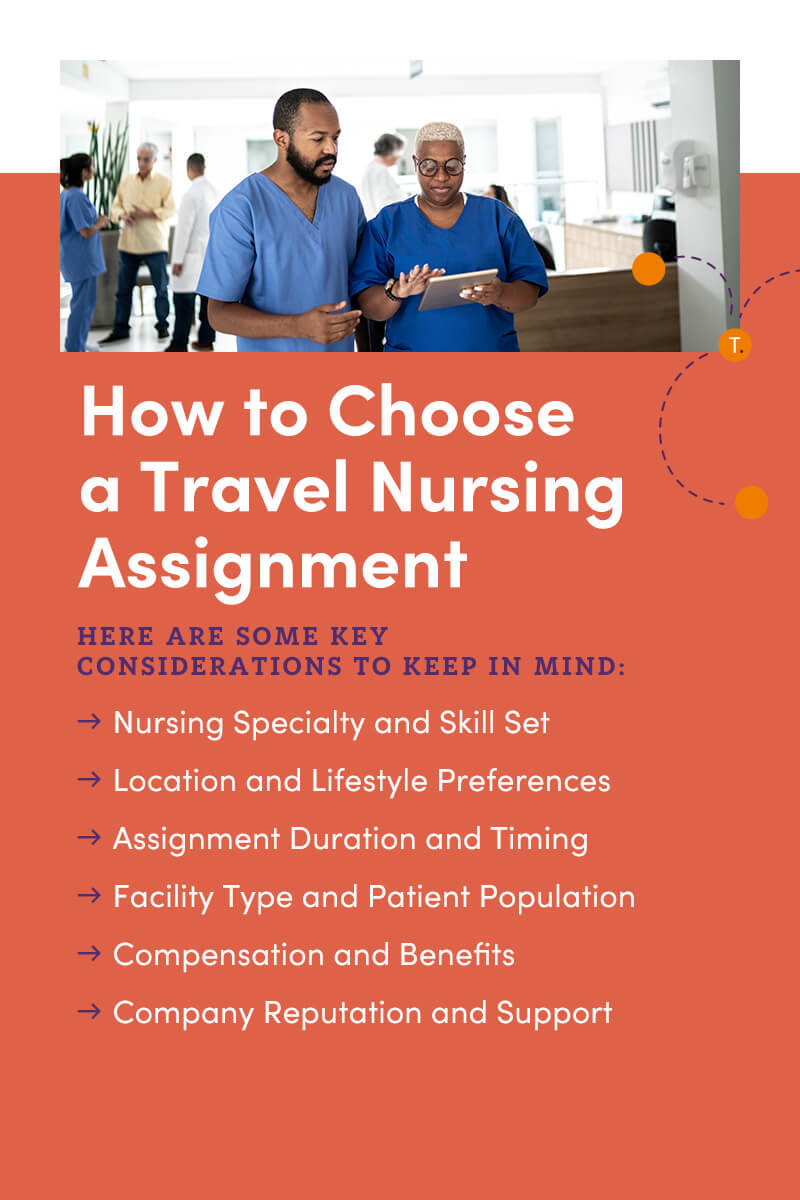An
company | Brands
Types of Travel Nursing Assignments
Blog/Types of Travel Nursing Assignments
Are you a nurse looking for adventure, flexibility and the chance to make meaningful impact and connections in a new way? Travel nursing offers an exciting opportunity to:
Explore different locations
Gain diverse experiences
Foster relationships with patients and colleagues worldwide
Make a positive impact
As a travel nurse, you can choose from various travel nursing assignments that suit your preferences and career goals. If this sounds like your ideal career, keep reading to learn about the different types of travel nurse assignments, their characteristics and how to choose the perfect travel nurse assignment for you.
Short-Term Assignments
Short-term nursing travel assignments are popular for nurses seeking variety and career flexibility.

The shortest travel nursing assignments are as little as four weeks long, while six- and eight-week assignments are slightly more common. The standard length of a short-term travel nursing assignment is 13 weeks, which is ideal to settle down, explore and enjoy a new location without committing to staying.
A short travel nurse assignment length means you’ll be rapidly immersed in a new work environment and be asked to adapt quickly. You’ll get exposed to diverse patient cases and healthcare teams and learn new skills fast.
The advantages of short-term assignments are:
Variety and flexibility in work settings and locations, especially in four-week travel nurse assignments
The opportunity to travel and explore new places, especially with six-week travel nurse assignments
A diverse nursing experience
The chance to meet new people and expand your professional network, with 13-week assignments providing ample time to get to know your coworkers
However, short-term assignments bring a few challenges:
Frequent adjustments to new work environments and protocols
Less time to develop deep connections with colleagues and patients
Potential for gaps between assignments
Long-Term Assignments
Long-term travel nursing assignments typically last 13 weeks more, with some extending up to 26 weeks or even a year. The longer travel nurse job length allows for a more in-depth experience and the chance to truly become part of a healthcare team.
Long-term nursing assignments have several benefits, including:
More time to build relationships with patients and colleagues
The opportunity to fully immerse yourself in a new location
Greater stability and predictability in your work schedule
Potential for assignment extensions and permanent positions
High likelihood of benefits such as housing stipends or completion bonuses
They also have some drawbacks, such as:
Less variety in work settings and locations compared to short-term assignments
Longer commitments that limit flexibility to pursue other opportunities
Possible challenges detaching and moving back home once the assignment is complete
Crisis Assignments
During times of heightened need, crisis travel nurse assignments provide critical support to healthcare facilities and communities in need. Crisis assignments may arise during pandemics, disease outbreaks and staffing shortages due to unexpected events and emergencies. These nurses can also provide assistance after natural disasters, such as hurricanes, wildfires and earthquakes. Crisis travel nursing assignments are a type of short-term assignment.
The main advantages of crisis travel nurse assignments are:
The opportunity to provide relief and support during times of crisis
Potential for higher pay rates due to urgent staffing needs
The chance to develop emergency response and critical care skills
Exposure to unique healthcare situations
Disadvantages of crisis assignments include:
Unpredictable and potentially stressful work environments
Longer shifts and overtime hours
Limited time for preparation and orientation
Seasonal Assignments
Seasonal travel nurse assignments cater to fluctuating healthcare needs throughout the year, such as flu season, holiday-related or tourist season staffing shortages. These assignments offer the chance to provide essential support during peak demand periods. Depending on the season, they can last for four to 13 weeks.
The advantages of seasonal travel nursing assignments include:
Predictable demand for nursing services, meaning you can plan ahead to take assignments during a specific period
The opportunity to experience different locations during peak seasons
Potential for competitive pay rates due to high demand
The chance to develop specialized skills related to seasonal healthcare needs
Seasonal assignments also have a few disadvantages, including:
Assignments in high demand, as many nurses can plan ahead and request them
Low availability for competitive locations
Increased workload and patient volume during peak seasons
Possible challenges in securing housing
International Assignments
International travel nursing assignments are typically long-term, ideal for adventurous nurses who want to combine their passion for travel with their nursing career. These assignments offer a unique opportunity to experience diverse healthcare systems and cultures. Popular destinations for international travel nursing assignments include Australia, the Caribbean Islands, the United Arab Emirates, Ireland and cruise ships.
The pros of international assignments are:
Immersive cultural experiences and the chance to explore new countries
Exposure to
and practices
Personal and professional growth through international experiences
Potential for competitive compensation packages and travel benefits
The chance to make a positive impact on underserved communities
While they’re lucrative, international travel nursing assignments have some cons:
The challenges of adapting to new healthcare regulations and protocols
Language and cultural barriers
Additional licensing and certification requirements
Potential visa requirements
Distance from family and friends
How to Qualify for Travel Nursing Assignments
Qualifying for travel nursing assignments requires a combination of education, experience and professional credentials. Whether you’re a seasoned nurse looking for a career change or a recent college grad eager to explore the world while growing your career, meeting the necessary qualifications is essential to securing your desired travel nurse assignment.
1. Education and Licensure
Before you can become a travel nurse, you must complete an accredited nursing program and obtain a nursing degree. The most common pathways include earning an Associate Degree in Nursing (ADN) or a Bachelor of Science in Nursing (BSN). Either degree will qualify you for travel nursing, but some healthcare facilities only take nurses with a BSN.
After finishing your nursing education, you must pass the National Council Licensure Examination (NCLEX) to obtain your registered nurse (RN) license. The RN license is a fundamental requirement for all travel nursing assignments.
Some states participate in the Nurse Licensure Compact (NLC), which allows nurses to practice in multiple states with a single license. If your desired assignment is in a noncompact state, you may need to obtain a separate license for that particular state.
International travel nursing assignments may require additional certifications, licenses and qualifications to allow you to work in the country of your choice.
2. Clinical Experience
Travel nursing assignments often require a certain level of clinical experience. Many travel nursing companies and healthcare facilities need at least one to two years of recent, relevant clinical experience in your specialty area. This experience ensures your ability to provide quality patient care, adapt to new environments and work efficiently in a team setting.

You can gain clinical experience by working in a hospital, clinic or other healthcare setting. Focus on building a strong foundation in your chosen specialty, as this will make you more competitive for travel nursing assignments. Seek opportunities to expand your skills, such as working in different units or participating in professional development courses.
3. Specialty Certifications
While not always required, specialty certifications can greatly enhance your qualifications for travel nursing assignments. These certifications demonstrate your expertise and commitment to a specific area of nursing, such as critical care, emergency nursing or pediatrics. Obtaining specialty certifications can make you a more desirable applicant, particularly for assignments in high-demand or specialized units.
To pursue specialty certification, you typically must meet specific eligibility criteria, such as having minimum clinical experience in the specialty area and passing a certification area. Some common certifications for travel nurses include:
Critical Care Registered Nurse (CCRN)
Pediatric Advanced Life Support (PALS)
Advanced Cardiovascular Life Support (ACLS)
Trauma Nurse Core Course (TNCC)
Research the certifications relevant to your specialty and consider investing and effort in obtaining them to boost your travel nursing qualifications.
4. Professional References and Background Checks
As part of the qualification process for travel nursing assignments, you’ll need to provide professional references and undergo background checks. Maintain positive relationships with your colleagues, supervisors and other healthcare professionals, as they can provide valuable references when you’re applying for travel nursing positions.
Travel nursing agencies and healthcare facilities will also conduct thorough background checks to ensure patient safety and compliance with regulations. These inspections may include criminal background checks, drug screenings and verification of your education, licensure and employment history. Maintain a clean professional record and be transparent about potential issues that may arise during the background check process.
5. Flexibility and Adaptability
While not a formal qualification, flexibility and adaptability are key traits that can make you a successful travel nurse. Travel nursing assignments often involve working in new environments, collaborating with different healthcare teams and adapting to varying patient populations and protocols. Demonstrating your ability to embrace change, think on your feet and maintain a positive attitude can set you apart as a strong applicant for travel nursing opportunities.
How to Choose a Travel Nursing Assignment
Choosing the right travel nurse assignment involves considering various factors that align with your personal and professional goals. Here are some key considerations to keep in mind:

1. Nursing Specialty and Skill Set
Consider assignments that match your area of expertise and allow you to use and expand your nursing skills. Look for opportunities that provide exposure to new techniques, technologies or patient populations within your specialty.
2. Location and Lifestyle Preferences
Think about the geographical location and lifestyle you desire during your assignment. Consider factors such as climate, urban or rural setting, proximity to attractions or outdoor activities and cost of living. Choose locations that align with your interests and preferences.
3. Assignment Duration and Timing
Determine which travel nurse job length suits your needs and availability. When selecting assignment durations, consider commitments in your personal life, such as family obligations or planned vacations. Be mindful of travel nurse rules or requirements regarding consecutive assignments or time off between assignments.
4. Facility Type and Patient Population
Research the healthcare facilities and patient populations you’ll work with during your assignment. Think about the type of facility, such as a teaching hospital, community clinic or specialized unit, and the demographics of the patient population. Ensure the assignment aligns with your clinical interests and experience.
5. Compensation and Benefits
Evaluate the compensation package, including hourly pay rates, housing stipends, travel reimbursements and any additional benefits such as health insurance or retirement funding. Compare offerings from different travel nursing companies and assignments to ensure fair and competitive compensation.
6. Company Reputation and Support
Choose a reputable travel nursing company that provides comprehensive support throughout your assignment. Look for companies with responsive communication, experienced recruiters and a track record of placing nurses in high-quality facilities. Look at the company’s support services, such as housing assistance, clinical liaison and mental health support facilities.
Find Your Ideal Travel Nursing Assignment With Trustaff
Exploring the types of travel nursing assignments available allows you to craft a nursing career that aligns with your personal and professional aspirations. Whether you thrive on the excitement of short-term nursing travel assignments, prefer the stability of long-term placements or seek the fulfillment of specialized or international experiences, there’s a travel nurse assignment for you.
As you embark on your travel nursing journey, remember to prioritize your well-being, embrace growth opportunities and make meaningful connections with patients and colleagues along the way. With the right mindset and support, travel nursing is an incredibly rewarding and enriching career.
Trustaff is dedicated to helping you find the perfect travel nurse assignment that matches your skills, preferences and career goals. Our experienced team is here to guide you through the process, provide personalized support and ensure you have access to top-notch facilities and competitive benefits.
Are you ready to start your travel nursing adventure? Explore Trustaff’s current travel nurse job openings and take the first step towards an exciting and fulfilling nursing career. Join us today and positively impact patient lives while experiencing the joys of travel nursing.
For any questions about our services and offerings, send us a message or call 877-625-1840.



